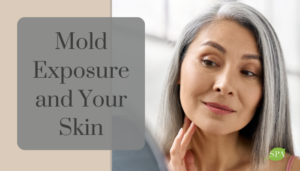Today we’re covering the mind & skin connection – which is often not talked about as skin issues are often thought of just as an external issue – or a vanity problem, however, we all know it goes much deeper than that.
You’ll hear about how I struggled as a little girl with self-esteem issues due to being bullied at school since I was different, and missed out on a lot because of health issues – I had skin reactions to medications and constantly felt alone as we tried to find a solution to my health.
Skin conditions like acne, eczema, rosacea, psoriasis, vitiligo and even premature aging can both cause AND be triggered by stress!
What Stress Will Do To Your Skin
- Acne: When you are stressed out, your adrenal glands release the hormone cortisol. A surge in cortisol causes increased sebum production, which triggers acne.
- Eczema and other skin conditions: Anxiety and stress at work, school, and home can make skin conditions flare up.
- Vitiligo and Psoriasis: Stress negatively impacts our immune system and being anxious or stressed can aggravate these autoimmune conditions.
- Aging: Excessive frown lines, happen more with chronic stress. High levels of cortisol are likely to cause swelling, insomnia, weight gain. – which makes the aging process worse.
Covering up skin blemishes with makeup or trying to turn back the clock with botox/plastic surgery and topical steroids can suppress a skin eruption – Yet none of these address your skin problem!
A survey was done by the National Rosacea Society, 70% of people with severe rosacea symptoms said it negatively affected their professional interactions, and 41% said rosacea made them avoid public contact or cancel plans.
Top 10 Tips to Decrease Stress to Enhance your Mind, Mood and Skin
- Laugh – When we laugh, our cortisol levels drop and serotonin (our mood-boosting neurotransmitter) increases. It’s really the fastest and easiest way to stop stress fast.
- Breathe – This might seem like a simple task, but most people don’t know how to breathe to relieve stress. The first step is to be aware of your breathing. Next, take deep breaths that expand your chest and belly while relaxing your muscles in your neck and shoulders. (Tip: try counting to 10 breathing inward and then another 10 count breathing out.)
- Surround yourself with positive people – We can’t always choose who is around us at work and school, but we can choose the people we are with, in our free time. When we’re positive too, our skin is more likely to heal and have a healthy glow.
- Do visualization exercises – It only takes a few minutes and can quickly reduce stress. Close your eyes and picture a scene you love such as a beach, mountaintop, or picnic spot, and sit quietly to fully experience the beauty, serenity and joy it brings. If you have skin issues, you can also visualize healing of your tissues and healthy, glowing skin taking over.
- Get outside – Get away from your computer, phone, and stressful situations and into nature. Even if it’s just a walk around the block, a few moments in the sun or fresh air it can boost your mood and give you a little extra Vitamin D to brighten your day.
- Move your body – Studies show that moderate exercise improves our energy, mood, and sleep. If we exercise every morning, it can help balance our adrenal function to help us better cope with stress.
- Sleep soundly – Sleep is essential for helping us energize, manage stress, stay focused and be positive. Optimally, we should all get about 8 hours of uninterrupted sleep each night. (Tip: Try taking a warm bath with a few drops of lavender essential oil and some Epsom salt before bedtime.)
- Eat a healthy diet – Include plenty of fresh fruits, vegetables and high quality protein to ensure your body has all the nutrients it needs to keep your hormones balanced and your skin healthy. (Tip: Start your day with a nutrient-packed smoothie and skip the grains and sugar.)
- Practice gratitude – Gratitude is about appreciating what you have around you. Research shows gratitude helps us feel happier, improve our health, be better at dealing with problems that arise, and build solid relationships. (Tip: Start a gratitude journal and write down 1 thing every day that you’re grateful for.)
- Meditate and/or pray – Research shows that meditation helps you lower stress, be more compassionate, improve sleep, boost mood, decrease inflammation, and even lower yearly doctor costs! The goal of meditation is to focus and quiet your mind in order to have greater clarity and inner calm. (Tip: Simply close your eyes and focus on a word that brings you a sense of peace. Let go of all other thoughts.)







Reader Interactions